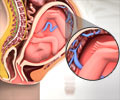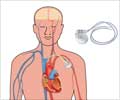Cecil Medicine, 23rd Ed.
- Harrison''s PRINCIPLES OF INTERNAL MEDICINE, 17TH Edition
- Amsterdam EA. Revised American College of Cardiology/American Heart Association guidelines for the management of heart failure. Prev Cardiol. 2005 Fall;8(4):254, 256.
- Heart Failure Society Of America. Evaluation and management of patients with acute decompensated heart failure. J Card Fail. 2006 Feb;12(1):e86-e103. Review.
About
Congestive heart failure (CHF) is a condition in which the heart fails to work adequately as a pump that can deliver oxygen rich blood to the body.

The heart is made up of four chambers: two atria and two ventricles. The ventricles make up the lower chambers of the heart. They pump blood during the contraction of the muscles. This event is called systole. After each ventricular contraction (systole) the ventricle muscles take some time to relax during which blood from the upper chambers (atria) fills them. This is the diastole.
A number of conditions cause diminished pumping ability of the ventricles. Heart attacks and infections (myocarditis) weaken the ventricular muscles leading to systolic dysfunction.
Congestive heart failure can be caused by:
- Diseases in which the heart muscle weakens
- Diseases in which the heart muscles stiffens
- Conditions where oxygen demand by the body tissue is beyond the capacity of the heart (It is the heart that has to deliver adequate oxygen-rich blood)
Conditions like hemochromatosis (iron overload) or amyloidosis cause stiffening of heart muscles. The ventricles'' capacity to relax is impaired and this is termed diastolic dysfunction. Long standing high blood pressure leads to a hypertrophied (i.e. a thickened) heart.
In some patients the pumping action remains normal but the body requirements are much higher than what the heart can deliver. Conditions like anaemia or hyperthyroidism are often responsible for this.
In some individuals one or more of these factors can co-exist and may present as a congestive heart failure. Let us focus on the congestive heart failure that is due to heart muscle weakness, i.e. systolic dysfunction.
 MEDINDIA
MEDINDIA
 Email
Email








